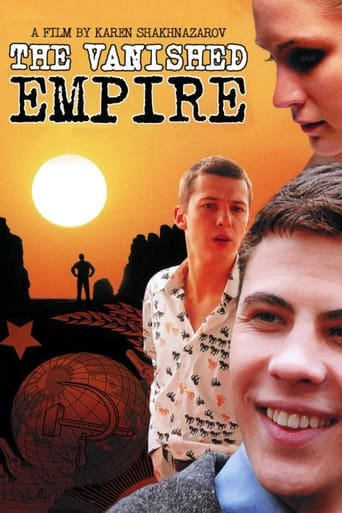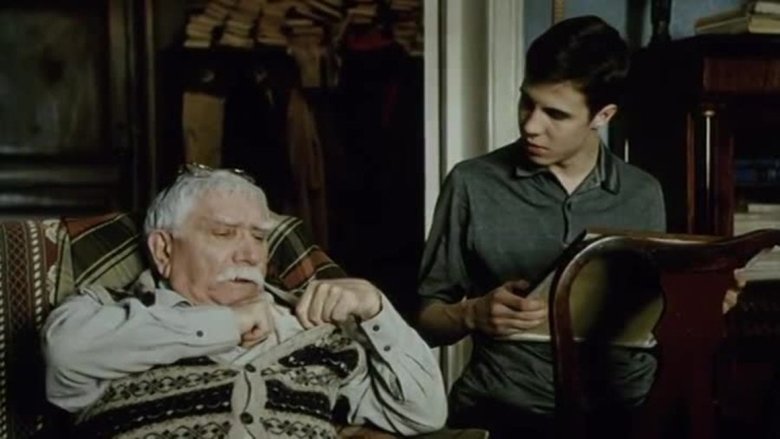

Vanished Empire (2008)
This story take place in Moscow during the 1970s and unfolds around the love triangle between two young men and a girl who study at the same university. They argue, make up, and face their first disappointments and victories. While busy with personal lives and loves, they miss foreseeing that the country in which they were born and live will soon disappear from the map.
Watch Trailer
Cast
Reviews
Overrated
Highly Overrated But Still Good
This is a small, humorous movie in some ways, but it has a huge heart. What a nice experience.
This is a gorgeous movie made by a gorgeous spirit.
Karen Shakhnazarov's films are all, in a sense, "period pieces." They find a solid place in international film festival culture without ever quite winning the prize. "Vanished Empire" had a particularly personal ring for me, since I began my long-time study in and out of Soviet/Post-Soviet Russia in the period this film depicts (circa 1974), and had an uncomfortably eerie sense of deja-vu throughout the film. Searching for an American parallel, I came up with "American Graffiti," where Richard Dreyfus's character is caught between remaining in his Middle-American hometown or heading off to an Eastern college (as he does) and returning many years later to write about it.Shakhnazarov's film has a similarly autobiographical feel to it, although his young hero ends embracing, rather than rejecting, the culture from which he emerged: the Russian intelligentsia. The meticulous reproduction of the Soviet 1970's offers a vaguely satiric self- portrait, hinting at the educated class's role in preserving world culture and history while rejecting indoctrination into Soviet politics and values. Therefore, the young hero, Sergey's true love is not, as he believes, the "good girl," Lyuda, who prefers the ACTUAL recording of "Swan Lake" (a covert reference to the ballet's role in service to the state) contained in the black market record jacket of the Rolling Stone latest release to the Western contraband recording that Sergey has paid dearly for, expecting to win her affections. Sergey's instinctual pull towards rebellion keep him from romanic fulfillment, but bring him closer to his true self.Instead, Sergey comes to love and honor his dying mother, and follows his grandfather's advice by making a pilgrimage to the archaeological site that represented his family's life's work.In the ancient desert sands, Sergey finds the source of his earlier hallucinatory, drug-induced vision.Emblematic details (cars, records, ancient trinkets) speak to viewers with Shaknazarov's background. Reading them properly, however, requires something of the education Shaknazarov's hero gained in the intervening years between the "coming of age" story and the film's contemporary epilogue.
Those who have been films by Russian director Karen Shakhnazarov will surely waste no time in recognizing certain similarities which exist in "Ischeznuvshaya Imperiya" and one of his old films "Kuryer" which was made in 1987.Both these films gives viewers outside of Russia a very basic yet subtle idea of what it takes to be a youngster in mighty Russia.Although music and young people can be found in both these films,it should be noted that these films must be analyzed using absolutely different ideological yardsticks.A word for those who have not seen old films by Karen Shakhnazarov.They should be requested to have an attentive look at them at the earliest in order to understand how Karen Shakhnazarov has nicely blended his love for music and Russian youth in most of his films.This is something which has given a distinct edge of lightness to the image of Russian cinema which has earned the dubious notoriety of following a recognizable pattern of serious,occult themes."The Vanished Empire" is a curious title which might induce funny ideas in inattentive viewers' heads but this film is only mildly critical of Russian state.The highlight of this film is its depiction of joys of friendship in true Russian style.If surprise end is any indication of a film's ingenuity then "The Vanished Empire" would surely win many a heart by being a truly heroic film showing the frustrations of hapless Russian youth.Film critic Lalit Rao interviewed MOSFILM studio CEO and Russian director Karen Shakhnazarov during a screening of this film at 13th International Film Festival of Kerala 2008 (IFFK) which organized a retrospective of his films.
We see few Russian films here in the U.S. and our familiarity with modern day Russian life is limited. Here we get a view of life in the Brezhnev 1970s. "Vanished Empire" reassures us that the Russians are just like everybody else, save for social conditioning and a scarcity of consumer goods. It's convincing characters are warm, animated and full of very familiar foibles. But it is charming how readily family and friends "do" for each other there,enthusiastically.Yet this is a society so parched for Western-style consumer goods that a used Japanese radio can get a buddy out of police custody, a nice jacket plus gas money can induce a cab driver to take someone to the hinterlands and back.Sergey, the focal character, is well and charmingly rendered by young Aleksandr Lyapin. Like a lot of 18 year old college boys he is impulsive and easily suggestible. His romance with girlfriend Lyuda is in full bloom but a call from his comrades can make him forget his commitments to the lady. More than once Sergey shows that loyalty to his buddies trumps faithfulness to his lover.Sergey's inattention to those who love him and his hijinks in school are forgiven, up to a point, because of his youth and charm. But the carefree life and luck of a teenager cannot last. Life becomes serious and the due bill for self-centered presumptions is, inevitably, presented.The women characters in this film are long suffering. Though not ill-treated physically, they are never valued above male comradeship. Their needs are not thought of, or not taken seriously. Lyuda's treatment by Sergey reminded me of the comment of an American exchange student who had boyfriends in the Soviet 1970s. Asked if she ever considered marrying any of them, she said "No." She said that, in Russia, "a woman might be loved but she will never be respected." Jim Smith
I am Portuguese so, despite being born in the 80', i know a few things about a country trying to overcome its own memory. For those who don't know, Portugal was the late perpetrator in Europe of a fascist concept of "empire", a retro idea that stuck cultural life and true evolution for decades in some countries. It finished for us in the mid 70', but dealing with such a radical change of collective definition is something that drags to these days, watered by an upgrade in the Portuguese general living conditions, but still there.Now i think the Soviet experiment was probably more radical and fundamentalist to its populations than the Latin European fascisms. And it lasted longer. So, dealing with the radical shift towards a forced "western democracy" approach is probably a painful process for the ex soviet territories, mostly the russians. That's the frame where i place this specific picture. I watched it as an exorcism of past phantoms, but also a blinking melancholic eye to those days.The facts in the story, which is casual (it is here as a 'typical' repetitive case, in those days) all speak against what was happening in that regime in that context, but yet it avoids moralizing. No one is judged (unlike, for example, in "The lives of the others") and no one is innocent. It's a kind of approach that assumes that we must feel what was going on regardless of the upper political or power contexts that forged what we see. I accept that vision, i enjoyed it. The cinematic options here were fully coherent to what we saw, and from time to time i saw Tarkovsky here, who has much to do with how cinema bends memory. Nice to remember a social context, a certain youth i never got to know, and a certain kind of cinema that is sweet and sometimes (not this case) deep and life-altering.My opinion: 3/5 FantasPorto http://www.7eyes.wordpress.com


